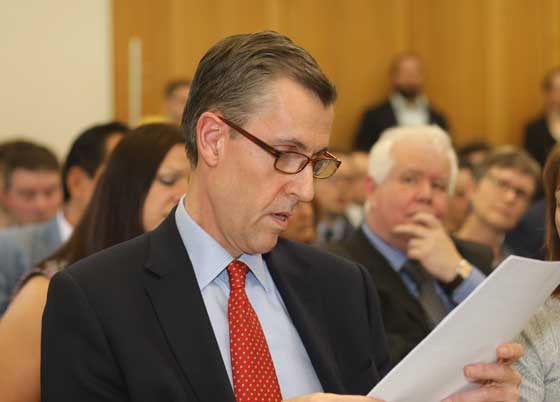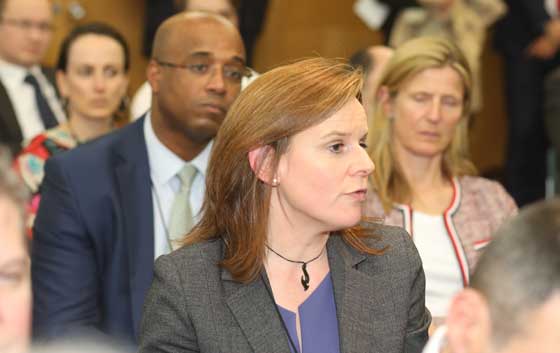
The government is calling on all those who bought re-sale properties with doubling ground rents to contact it.
This emerged after Andrew Selous, Conservative MP for South West Bedfordshire, raised the issue at the APPG meeting on April 26.
“Taylor Wimpey sold a lot of leases in my constituency, but I have a constituent who bought his property from someone who first bought from Taylor Wimpey and now the house builder is refusing to compensate him.
“I have a letter here from the Housing Minister Heather Wheeler on February 23 saying that the government does want housebuilders to extend the support to all, including those who bought their leases as second-hand buyers.”
Lakhbir Hans, the civil servant who heads the leasehold team, said she thought ministers were “still very keen that leaseholders have access to compensation schemes” and that the department was “monitoring the situation”.
Sir Peter Bottomley, APPG co-chair and co-patron of LKP, said: “We should put it round to all members of this group that if they have constituents who caught in this trap having bought second hand they should send details to the department so we have illustrative examples and can show how widespread the problem is.”

Beth Rudolf, of the Conveyancing Association, said it had carried out a survey of 1,200 homeowners and 235 said that they had not received any information up front from Taylor Wimpey, which “they should have done under the consumer protection and unfair trading regulations”.
“The difficulty is that if you want to enforce that trading standards has no resources and only have a £250,000 budget to enforce against 14000 estate agents.
“Can we please get some money into trading standards so they can carry out an investigation into why people are not being a advised of key information prior to purchasing a lease?”
Sir Peter Bottomley suggested that the survey be sent to ministers and copied to the secretary of the All-Party Parliamentary Group, LKP.





 Law Commissioner Nicholas Hopkins hopes his work prompts complete reform of leasehold
Law Commissioner Nicholas Hopkins hopes his work prompts complete reform of leasehold






















“Beth Rudolf, of the Conveyancing Association, said it had carried out a survey of 1,200 homeowners and 235 said that they had not received any information up front from Taylor Wimpey, which “they should have done under the consumer protection and unfair trading regulations”.”
Beth should be asking the rather more important question as to why the conveyancers who acted for these unfortunate second hand buyers failed to spot this massive defect in the title and/or to warn their clients about it.
The standard of conveyancing in every one of these transactions is way below what the client should have been entitled to expect, and it’s the conveyancers who should be offering to compensate the buyers of second hand properties, not Taylor Wimpey.
I have a lot of time for Mr Selous, he has been a very good MP for my area over the years and long may it continue.
If a purchaser buys the property at a discount because of the ground rent terms should that buyer be able to claim compensation ?
A ground rent can only be judged to be onerous when all the terms of acquisition are shown..
Again if the NPV of the ground rent is shown next to the premium when the flat is sold the problem of onerous rents would never have arisen
Stephen. Are you suggesting it is the first purchaser of the property from TW who should receive compensation, if the he/she has sold it in a resale at a reduced price due to doubling ground rent.
łthe original purchaser who sold at a lower than normal price should have a greater claim for any compensation rather than the buyer who buys the property at a discount .
If the buyer buys at less than the normal price because of the rent then he should not need compensation . Therefore mandatory right to compensation is not necessarily appropriate for second hand purchasers – it all depends on what was paid for the property
It’s a very complicated calculation to make. Some very streetwise purchasers will have bought the property at a discount whereas others will have paid at the going rate because they were unaware of the Ground Rent problem..
And who decides the fair price of the property if there had not been a ground rent problem.
We must at present remember that no leaseholder is being compensated, whether first time buyers, second ,third etc.
The only people at present being compensated are the Freehold Investors. eg the TW solution.
Possibly widening the scope of the unfair contract terms act so that if a purchaser can show that the NPV of the ground rent stream plus the price paid for the property is materially different they can seek redress .
Not easy but on estate type houses with comparatives it may be possible
The problem will always be that to demonstrate that a ground rent is onerous you have to compare it to the whole deal to make sure that the premium received for the lease was not discounted to reflect the rent terms
I do not think there is any need to demonstrate that since around 2007 the major developers have been discounting property prices due to terms of the lease.
I have not seen any evidence to suggest that they have been discounting.
In fact in the past TW have always argued that their leasehold properties were as sellable as the freehold version. It is only due to public pressure in the last 18 months that they have woken up to the fact that this is not the case.
What basis does TW put forward, for not compensating all buyers in full and equal measure? I don’t have any of the lease details, or details of how the freehold was passed on, but contractually in general terms, the original grantor is normally ‘on the hook’ throughout the lease, for the full obligations under each contract.
Is there some valid argument that Lessor2’s situation is not as bad as Lessor1’s would have been? Not sure how TW are justifying this. Are they saying that buyers knew there was a problem? Or that they ‘should have’ known?
Or are TW saying that doubling ground rents are ok, and the only problem is the mortgage company?
If we take Taylor Wimpey’s position to its logical conclusion and apply it to the motor industry it would mean that if a faulty vehicle had to be recalled for whatever reason it only apply to first time purchasers..
I would assume that TW would not know who the subsequent buyers are after the first time buyer. Or would they be able to find out by way of the freeholder company to whom they sold the freehold.
It makes it all the more important that any leaseholder in a TW house (whether a first, second ,third,time, etc, buyer, becomes aware of their situation so that they can press for a satisfactory resolution.
Michael, The land registry would give them that information would it not?
Michael, If the Land Registry has records of every TW leasehold house and the first time and subsequent buyers, would they make this information available to the likes of LKP.
For some time now LKP have been asking TW for this information.
Yes they would, but unfortunately there would be a charge for each request which LKP would have to pay. So whilst it would be of great benefit this would be impracticable . LKP and their supporters cannot do everything.
In this case the individual “homeowners” should supply the information to LKP.
If the Land Registry has this information would they be prepared to disclose it (say to the Housing Minister) in the public interest.
Exactly Michael. We’ve seen a widespread shift in accepted ‘legal opinion’ in the last few decades. I believe this is a relatively new phenomenon based on what lawyers think their clients can get away with in a post-truth age. But a lease, fundamentally, is a contract like any other: an agreement with a quid pro quo, an everyday concept.
The ‘shift in opinion’ derives as we know from landlord-led wishful thinking. It has become commonplace, so accepted, in my experience by housing ministers and others in authority. It serves government cost-cutting exercises as well as developers and landlords of all kinds. But the underlying mechanics in my view have a seriously criminal logic fault running through them:
Agreements are FACT not law. ‘Assignment of Contract’, for obligations, therefore has to involve CONSENT. The common practice of relying on the 1705 statute (s. 142 of the LPA 1925) to transfer a freehold without the tenant’s consent (a) is not obligatory (it is the developer’s choice) and (b) means that the underlying contract is unaffected as far as the developers’ OBLIGATIONS are concerned to its home-buying customers. (Obligations cannot be assigned).
Customers in such cases would include subsequent homebuyers, since they take over the lease with the developer’s written consent. To argue that the developer has not itself consented (because it has parted as swiftly as possible with the land) is mischievous and disingenuous, since these manoeuvres are very obviously DESIGNED to avoid the original grantor’s obligations, through its own choice and unilateral manipulation regarding the identity of the ‘landlord’. In truth, the developer has merely DELEGATED its obligations to a third party of its own unilateral choosing, not freed itself of them.
Widespread acceptance of this practice has become a licence to commit fraud. We need some prosecutions, now, to deter this behaviour. Too many professions have a vested interest in not wanting that to happen, so they all say there is ‘legal doubt’, but it IS fraud when you analyse it.
We have a standard Law of Contract, reasonably highly-developed here and similar to such laws worldwide, based on commercial customs going back thousands of years. Some things never change. Reasonable people know perfectly well what an agreement is, and know the difference between breach and a deliberate swindle. Why let so many dress it up as a legal conundrum?
PROSECUTIONS PLEASE
(My own case, though small, is very clear cut. It would be a perfect way to send a message on behalf of all leaseholders, to highlight the way the statute of 1705 is being misused by developers, causing this variety of subsequent problems. I have no particular financial axe to grind, since I have already won the civil case. My remaining concern is that central and local government refuses to recognise that there is any real problem, for leaseholders, let alone that deception is involved. I think it would be a considerable public service if the LKP and others would lend morale support towards bringing a prosecution. Whether in my case or another suitable one – i.e. where repeated deception is definitely recorded in writing – I would like to lend a hand).
Dear sussex says,
I agree with your opinion assignment should not happen without consent. Perhaps APPG, LKP and NLC need to contact Land Registry and get the SFO or equivalent to launch an investigation to get this ball rolling.
Thanks S McDonald
I should emphasise that the original vendor obligations remain (to all lessees including subsequent lessees) only because of the current general practice, to omit the optional lessee consent process.
In case anyone reading this misunderstands: I don’t advocate bringing back the consent process. I advocate the view (as stated in the statute and court cases) that the original contract still runs, to the subsequent lessee’s advantage.
The fraud, as I see it, is in the constant fudging of those rights in order to avoid the original vendor’s responsibilities to ALL LESSEES equally. If what I read on this website is correct, several vendors would appear to be doing this, be it on doubling ground rent compensation or on cladding cost issues.